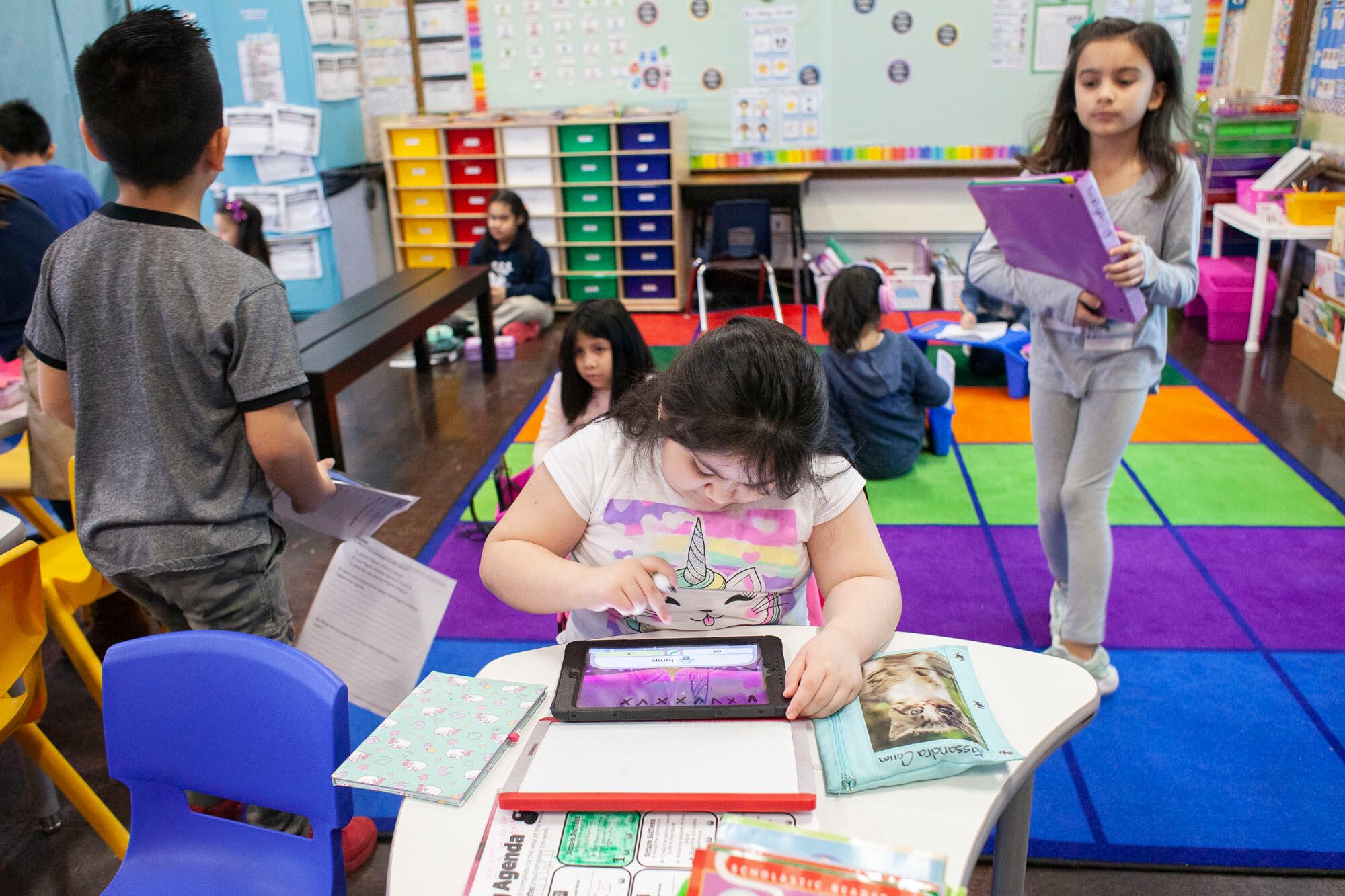Data analysis by Thomas Wilburn
Sign up for Chalkbeat Chicago’s free daily newsletter to keep up with the latest education news.
Melina Pereyra, a mom at the Acero charter network’s Cisneros campus, heard earlier this summer that her child’s Southwest Side school might cut staff.
She’d heard talk of city leaders’ disenchantment with school choice and of looming fiscal deficits tied to the end of federal COVID relief dollars. She worried: Would the district balance its budget on the backs of its charter schools?
But in a $9.9 billion proposed budget for next year released this week, Chicago Public Schools has avoided this approach. The district increased funding at charter schools by about 2.5% — even as some charters with shrinking enrollments are in line for steep cuts in the new budget blueprint.
This year, CPS overhauled budgeting for traditional campuses to deemphasize enrollment size and prioritize student needs. But for now, the district is sticking with so-called student-based budgeting for charters, which is more closely tied to enrollment; CPS says state requirements make it trickier to change budgeting for charter campuses. Yet as the district prepares a strategic plan to revitalize neighborhood schools, anxiety about how that vision will impact charters persists.
With roughly 55,000 students, charters serve about a fifth of Chicago’s public school student population. State law requires districts to provide charter schools money proportionate to what it spends at district-run campuses.
On a per-pupil basis, proposed funding for Chicago charters in the budget released this week grew less than 1% over last year, with average spending at about $16,200 per pupil, according to a Chalkbeat analysis.
Charter parents such as Pereyra have packed recent public forums on the upcoming strategic plan and school board meetings. The board appointed by Mayor Brandon Johnson — a charter school critic and former teachers union official — has increased its scrutiny of charters and has given them shorter contract renewals.
“We feel like we are in limbo,” Pereyra said of charter parents. “We want to know now what’s the plan for charter schools.”
A Chalkbeat analysis of preliminary charter budgets in the new CPS fiscal proposal shows they tracked closely with enrollment. As with district-run schools, there was a slight enrollment uptick at charters overall last fall. Generally, charter enrollment stayed more stable during the pandemic than at district-run schools, where there have been steep declines in the number of students.
While some charters that saw an influx of students this past school year are projected to get robust budget boosts, others with declining enrollment face steep cuts of 30% or more.
Andrew Broy of the advocacy group Illinois Network of Charter Schools said his organization is analyzing the budget plan to ensure charter funding complies with state requirements.
He said his group has fielded calls from some schools that question the adequacy of their special education and bilingual learner allocations. Generally, he said, campuses that don’t occupy district-owned buildings — and therefore receive facility dollars — fare better.
Broy noted that since CPS is still negotiating contracts with its unions for principals and teachers, the impact of labor costs on the budget is still in flux.
“These initial figures do show a slight per-pupil increase, but that masks a lot of variation among our members,” he said. “Until they vote on the budget, nothing is set in stone. We’re always concerned about financial pressures on CPS.”
Broy said he would like to see the district include charters, which primarily serve Black and Latino students from low-income backgrounds, in its new budgeting approach that focuses more on student needs.
In a statement, CPS said that the district stuck with its student-based budgeting approach for charters due to state law. But the district does plan to transition charters away from the method at some point, the district’s statement said.
Several charter schools declined to discuss the specifics of their proposed budgets or did not respond to requests for comment. One charter official who asked not to be identified in order to speak more freely said he was largely reassured by his school’s allocation. Though base funding from the district essentially remained flat, his school would get increases in special education and bilingual dollars as it has come to serve more students with those needs.
“It seems like this year the places where we saw increases were more need-based,” he said.
Pereyra, the mother of a third grader at Acero’s Cisneros campus, said she heard about likely staff cuts while volunteering at the school in June. Proposed funding data shows the school’s budget would be cut by more than 10% this year, to about $6 million. That comes on the heels of steep cuts the previous year as well.
Pereyra was especially distraught that last year the school lost its dean of students, whom she described as “the connection between parents and the school.”
Acero did not respond to requests for comment.
These possible cuts come in the wake of a 15% decline in enrollment last year to about 350 students at Acero’s Cisneros campus. The students at the Cisneros campus are overwhelmingly Latino and from low-income backgrounds. About 60% are learning English. Pereyra said the school’s supportive environment remains the best fit for her son — and she worries about its future.
“I don’t want other people making that choice for me,” she said.
Mila Koumpilova is Chalkbeat Chicago’s senior reporter covering Chicago Public Schools. Contact Mila at mkoumpilova@chalkbeat.org.






